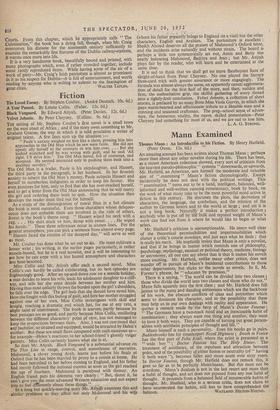Mann Examined
Thomas Mann : An Introduction to his Fiction. By Henry Hatfield. (Peter Owen. 12s. 6d.)
AN amazing amount has been written about Thomas Mann ; • perhaps more than about any other novelist during his life. There has been, as a recent American collection showed, every sort of criticism from the heaviest pseudo-philosophic " systems " downwards, or upwards. Mr. Hatfield, an American, sets himself the moderate and valuable aim of " examining " Mann's fiction chronologically. Except incidentally he does not deal with the political writings. This " examination " turns out to be a lucid, intelligent, balanced, well- informed and well-written running commentary, book by book, on the work of what many take to be the most powerful mind active in fiction in this century. He discusses the plots, the derivation of characters, the language, the symbolism, and the relation of the author to German letters and to the world at large ; and yet it is not a long book. Naturally it makes a perfect introduction I anybody who is put off by the bulk and reputed weight of Mann's work can find out from it where he would like to begin or what select.
Mr. Hatfield's criticism is unexceptionable. He steers well clear of the theoretical permissibilities and impermissibilities which clutter a critic's course nowdays, and just says what he finds ; that is really his merit. He implicitly insists that Mann is only a novelist, and that if he brings in matter which reminds one of philosophy, psychology, mythology, musical or political theory, medicine, biology or astronomy, all one can say about that is that it makes his novels more exciting. Mr. Hatfield, unlike many other critics, does not wander off in pursuit of Mann's incidental contributions to those other departments, but sticks to the novels as novels. In E. M. Forster's phrase, he " educates by precision." There is a saying, " The world can be divided into two classes f those who divide the world into two classes and those who do not." Mann falls squarely into the first class ; and Mr. Hatfield does full justice to the many. and dazzling antinomies which are the backbone of his work, the obscure conflicts of class and patriotism which seem to dominate his character, and to the possibility that these may help us in our own dealings with reality and appearance. He quotes a remark made by the hero of Mann's Doctor Faustus : " The Germans have a two-track mind and an inexcusable habit of combination ; they always want one thing and another, they want to have it both ways. They are capable of turning out great person- alities with antithetic principles of thought and life."
Mann himself is such a personality. Even his books go in pairs. Buddenbrooks has for counterpart Royal Highness ; Death in Venice has the first part of Felix Krull, where the artist is presented as a " wide boy " ; Doctor Faustus has The Holy Sinner. The treatment of antitheses, of the repulsion and attraction between poles, and of the possibility of either fusion or neutrality (of " having it both ways "), becomes fuller and more acute over sixty years. In Doctor Faustus, though Mr. Hatfield does not remark this, it goes so far as to be perfectly Manichacan. But this must not be overdone. Mann's dualism is not in the last resort any more than a habit of thought, and art does not proceed from any one habit of thought. It proceeds from a balanced field of innumerable habits of thought. Mr. Hatfield, who is a serious critic, does not claim to have enumerated the habits, still less to have comprehended the


















































 Previous page
Previous page